Author: SiteAdmin
Pastoral Council Minutes 03-21-2023
Pastoral Council Minutes 02-07-2023
Pastoral Council Minutes 01-07-2023
Pastoral Council Minutes 12-03-2022
04-08-23 Day 40 Holy Saturday
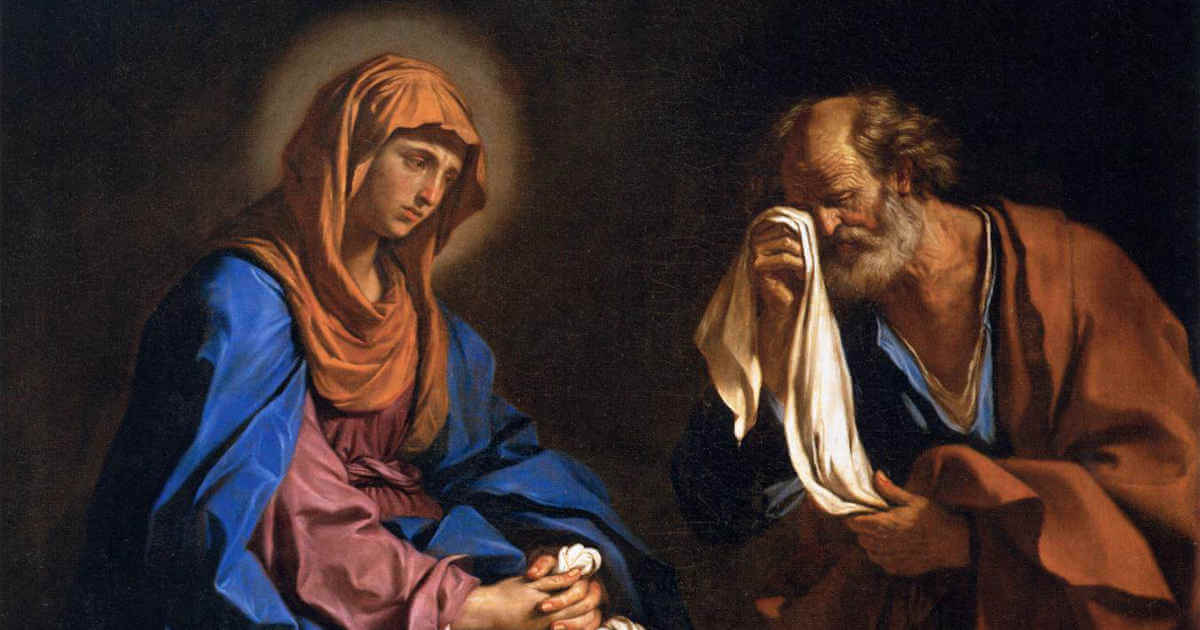

Our Lenten Journey / Caminar en Cuaresma
versión en español
Holy Saturday – April 8 – Day 40
Holy Saturday with Mother Mary
The Savior of the World died a cruel death upon the Cross. His broken body was laid in the tomb. His disciples scattered and were fearful that they would be next. But our Blessed Mother kept vigil in the perfect hope that her Son would soon rise.
Traditionally, Saturdays within the Church year are dedicated to the Blessed Virgin Mary. This ancient tradition developed in part due to the belief that, as others were filled with fear and confusion, Mother Mary kept vigil on Holy Saturday in prayerful anticipation of Jesus’ resurrection. She knew her Son would rise. She had hope beyond hope. Her faith was certain. Her love kept her vigilant as she awaited the return of her Son.
For many centuries, it has been suggested that the first person to whom Jesus appeared after His Resurrection was His own mother. Pope Saint John Paul II believed this. Saint Ignatius of Loyola believed it. And many others throughout the centuries shared this belief.
For these reasons, Holy Saturday is an ideal day to ponder the pondering heart of our Blessed Mother. There are several times in Sacred Scripture where we are told that Mother Mary pondered the mysteries of her Son’s life in her heart. She was one of the few who stood by Him in His agony and death. She stood before the Cross and prayerfully pondered His perfect sacrifice. The Blessed Mother held His dead body in her arms and pondered where His spirit had gone. And today she keeps vigil, pondering His imminent return to her.
Ponder her pondering heart. Try to unite your own heart with hers. Try to understand what she was thinking and hoping. Try to feel what she felt this sorrowful day. Try to experience her faith, her trust and her joyful expectation.
So many people in this world walk in despair and confusion. So many have lost hope in the new life that awaits them. So many have their own form of interior death without allowing God to draw them into His Resurrection. So many people today need the hope that was so alive in the heart of our Blessed Mother that first Holy Saturday.
Ponder the reality of Holy Saturday in silence this day and allow the glorious heart of our Blessed Mother to inspire you and draw you more deeply into her life of faith, hope and love.
Let us pray:
Dearest Mother Mary, on that first Holy Saturday, you kept vigil for your Son. You allowed the divine gift of hope to grow within you, and you allowed that hope to be your strength in the midst of the horror of the Cross. Pray for me that I may ponder your beautiful heart this day so that I, too, may be filled with hope as I endure the challenges of this earthly life. Give me a heart of joyful anticipation as I await the grace of new life our Lord so deeply desires to bestow upon me. Mother Mary, pray for me.
Source: mycatholic.life
USCCB Daily Readings: bible.usccb.org/bible/readings/040823.cfm
Sábado Santo – 8 de abril – Día 40
Holy Saturday with Mother Mary
El Salvador del Mundo murió una muerte cruel en la Cruz. Su cuerpo quebrantado fue colocado en la tumba. Sus discípulos se dispersaron y temieron que serían los siguientes. Pero nuestra Santísima Madre velaba con la perfecta esperanza de que su Hijo resucitaría pronto.
Tradicionalmente, los sábados dentro del año de la Iglesia están dedicados a la Santísima Virgen María. Esta antigua tradición se desarrolló en parte debido a la creencia de que, mientras otros estaban llenos de miedo y confusión, la Madre María se mantuvo en vigilia el Sábado Santo en oración anticipando la resurrección de Jesús. Ella sabía que su Hijo resucitaría. Tenía una esperanza más allá de la esperanza. Su fe era segura. Su amor la mantuvo vigilante mientras esperaba el regreso de su Hijo.
Durante muchos siglos, se ha sugerido que la primera persona a la que Jesús se le apareció después de Su resurrección fue Su propia madre. El Papa San Juan Pablo II creía esto. San Ignacio de Loyola lo creía. Y muchos otros a lo largo de los siglos compartieron esta creencia.
Por estas razones, el Sábado Santo es un día ideal para meditar el corazón meditabundo de nuestra Santísima Madre. Hay varias veces en la Sagrada Escritura donde se nos dice que la Madre María meditaba en su corazón los misterios de la vida de su Hijo. Ella fue una de las pocas que estuvieron a su lado en Su agonía y muerte. Se paró frente a la Cruz y reflexionó en oración sobre Su sacrificio perfecto. La Santísima Madre sostuvo Su cuerpo muerto en sus brazos y reflexionó sobre adónde se había ido Su espíritu. Y hoy vela, pensando en su inminente regreso.
Reflexiona sobre su corazón reflexivo. Trate de unir su propio corazón con el de ella. Trate de entender lo que ella estaba pensando y esperando. Trate de sentir lo que ella sintió este día doloroso. Traten de experimentar su fe, su confianza y su gozosa espera.
Tanta gente en este mundo camina en desesperación y confusión. Muchos han perdido la esperanza en la nueva vida que les espera. Muchos tienen su propia forma de muerte interior sin dejar que Dios los atraiga a su Resurrección. Tantas personas hoy necesitan la esperanza que estaba tan viva en el corazón de nuestra Santísima Madre ese primer Sábado Santo.
Reflexiona sobre la realidad del Sábado Santo en silencio este día y permite que el glorioso corazón de nuestra Santísima Madre te inspire y te atraiga más profundamente a su vida de fe, esperanza y amor.
Oremos:
Queridísima Madre María, en aquel primer Sábado Santo velaste por tu Hijo. Dejaste crecer en ti el don divino de la esperanza y dejaste que esa esperanza fuera tu fuerza en medio del horror de la Cruz. Oren por mí para que pueda reflexionar sobre su hermoso corazón este día para que yo también pueda estar lleno de esperanza mientras soporto los desafíos de esta vida terrenal. Dame un corazón de gozosa anticipación mientras espero la gracia de una nueva vida que nuestro Señor desea tan profundamente otorgarme. Madre María, ruega por mí.
Lecturas de Hoy: bible.usccb.org/es/bible/lecturas/040823.cfm
04-07-23 Day 39 Good Friday
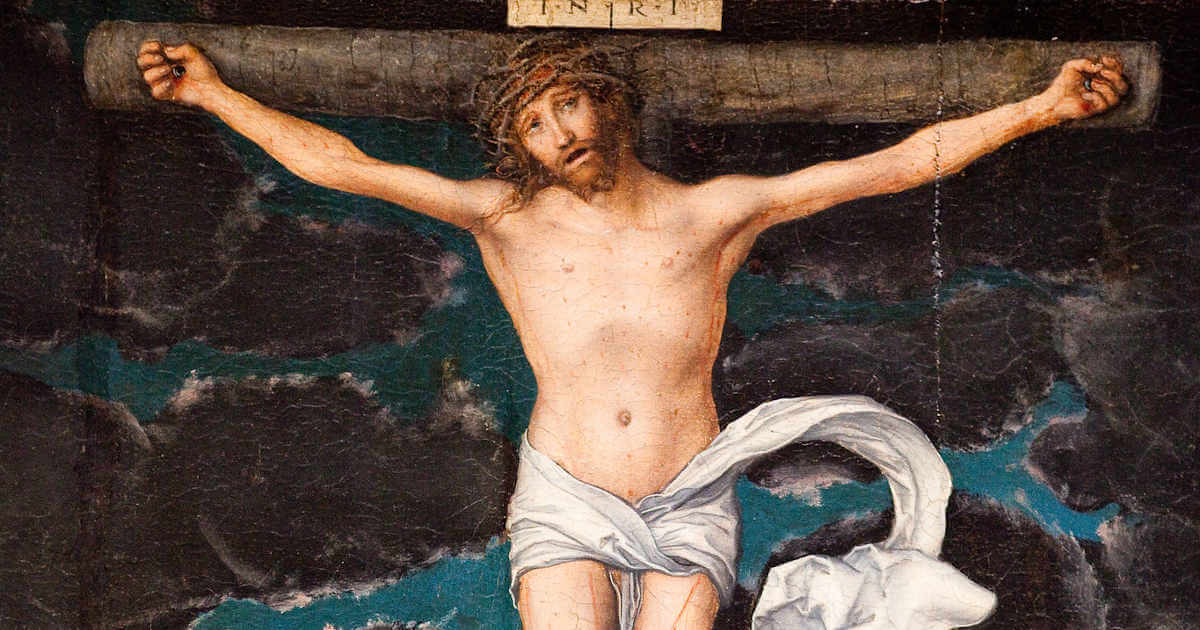
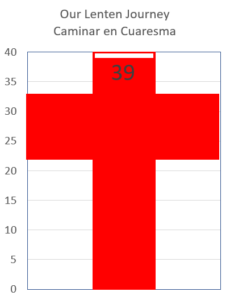
Our Lenten Journey / Caminar en Cuaresma
versión en español
Good Friday – April 7 – Day 39
The Greatest Act of Love Unfolds
Then he handed him over to them to be crucified. So they took Jesus, and, carrying the cross himself, he went out to what is called the Place of the Skull, in Hebrew, Golgotha. There they crucified him, and with him two others, one on either side, with Jesus in the middle. John 19:16–18
The Passion of our Lord begins. Our Gospel narrative today begins with Jesus going out to a garden with His disciples after the celebration of the Passover meal. It’s shocking to consider that the Second Person of the Most Holy Trinity permitted such injustice to befall Him. Though perfect in every way, He allowed Himself to be treated as a criminal, to suffer at the hands of sinners, and to die an agonizing death.
One of the first shocking events to take place in the Garden where Jesus was arrested was the sheer number of soldiers sent to arrest Him. A “band of soldiers” could mean that as many as 600 soldiers were sent to accomplish this deed. Going out with “lanterns, torches and weapons” reveals that it was dark. The symbolism of darkness is significant in John’s Gospel, portraying the spiritual darkness that permeated that night. Within that darkness, one of Jesus’ own Apostles betrayed Him, leading this massive number of soldiers to arrest Him.
Upon Jesus’ arrest, Peter, the soon-to-be leader of the Apostles, denies, for the first time, that he even knows Jesus. This happens while Jesus is interrogated by Annas, a respected former High Priest. The fact that a High Priest was the first to question Jesus shows that even those who are “religious” can, at times, be brutal instruments of attacks upon the faith. After Annas, Jesus is brought to Caiaphas, then acting as High Priest. During that interrogation, Peter denied our Lord a second time and then a third. These religious leaders concluded that Jesus must die. Recall that Caiaphas had previously argued that “it is better for you that one man should die instead of the people” (John 11:50). In fact, those words of Caiaphas were an unintended prophecy, predicting the death of our Lord for all the people.
Since the Jewish authorities did not have the power to crucify someone, they relied on the Roman governor Pilate. Although Pilate shows little interest in meeting their request, He does so out of fear of an uprising and reprisals from Caesar. Pilate also humiliates Jesus, scourging Him and permitting his soldiers to mock Him. Little did they know that the purple cloak with which they covered Jesus and the crown of thorns they placed on His head were symbols of Jesus’ true Kingship, exercised by His defeat of death itself in the battle for the salvation of souls.
When Jesus was crucified, He hung on the Cross between two thieves. As He agonized for three hours, He permitted His mother to stand by Him, entrusted her to the disciple John and John to her, drank of the wine to quench His thirst, spoke His final words, “It is finished,” and then He bowed His sacred head and handed over His spirit.
John’s Gospel relates to us that after Jesus was dead, a soldier pierced His side with a lance, and blood and water flowed out. This final gift from our Lord has been understood as a symbol of the Sacraments of Baptism and the Eucharist. It was truly finished. The King had won the battle. Death was defeated, and the means by which we are to share in that victory was given by the institution of the Sacraments.
Reflect, today, upon this most sacred scene. There is no end to the depth and breadth of the meaning of every action that took place that holy day. Every detail reveals the love of God. Every symbol points to the reality of what took place. Every word our Lord spoke is for us to hear, to receive and to believe. The meaning of Good Friday is beyond our human comprehension. Nonetheless, on this holy day we are called to prayerfully penetrate the meaning of this perfect act of love, so that we will more fully share in the grace given to us by our Lord.
Let us pray:
My crucified Lord, from the perspective of human beings, Your death was horrific. But from the perspective of Your Father in Heaven, Your death was the glorious fulfillment of His will. Through Your Passion and death, You exercised Your Kingship by taking authority over sin and death and commanding it to cease. May I stand with Your dear mother this day, dear Lord, and gaze with gratitude and awe on what You have done for me.
Source: mycatholic.life
USCCB Daily Readings: bible.usccb.org/bible/readings/040723.cfm
Viernes Santo – 7 de abril – Día 39
El mayor acto de amor se desarrolla
Luego se lo entregó para que lo crucificaran. Entonces tomaron a Jesús, y, llevando él mismo la cruz, salió al lugar que se llama el Lugar de la Calavera, en hebreo, Gólgota. Allí lo crucificaron, y con él a otros dos, uno a cada lado, con Jesús en medio. Juan 19:16–18
Comienza la Pasión de Nuestro Señor. Nuestra narración evangélica de hoy comienza con Jesús saliendo a un jardín con sus discípulos después de la celebración de la cena de Pascua. Es impactante considerar que la Segunda Persona de la Santísima Trinidad permitió que tal injusticia le sucediera. Aunque perfecto en todos los sentidos, se permitió ser tratado como un criminal, sufrir a manos de los pecadores y sufrir una muerte agonizante.
Uno de los primeros eventos impactantes que tuvo lugar en el Jardín donde Jesús fue arrestado fue la gran cantidad de soldados enviados para arrestarlo. Una “banda de soldados” podría significar que se enviaron hasta 600 soldados para lograr este hecho. Salir con “linternas, antorchas y armas” revela que estaba oscuro. El simbolismo de la oscuridad es significativo en el Evangelio de Juan, retratando la oscuridad espiritual que impregnaba esa noche. Dentro de esa oscuridad, uno de los propios apóstoles de Jesús lo traicionó, lo que llevó a esta gran cantidad de soldados a arrestarlo.
Tras el arresto de Jesús, Pedro, el futuro líder de los Apóstoles, niega, por primera vez, que conoce a Jesús. Esto sucede mientras Jesús es interrogado por Anás, un ex Sumo Sacerdote respetado. El hecho de que un Sumo Sacerdote fuera el primero en interrogar a Jesús muestra que incluso aquellos que son “religiosos” pueden, a veces, ser instrumentos brutales de ataques a la fe. Después de Anás, Jesús es llevado ante Caifás, actuando entonces como Sumo Sacerdote. Durante ese interrogatorio, Pedro negó a nuestro Señor una segunda vez y luego una tercera. Estos líderes religiosos concluyeron que Jesús debe morir. Recuerde que Caifás había argumentado anteriormente que “mejor te es que muera un hombre en lugar del pueblo” (Juan 11:50). De hecho, esas palabras de Caifás fueron una profecía no intencionada, prediciendo la muerte de nuestro Señor para todo el pueblo.
Como las autoridades judías no tenían el poder de crucificar a alguien, confiaron en el gobernador romano Pilato. Aunque Pilato muestra poco interés en atender su pedido, lo hace por temor a un levantamiento y represalias de César. Pilato también humilla a Jesús, azotándolo y permitiendo que sus soldados se burlen de Él. Poco sabían que el manto púrpura con el que cubrieron a Jesús y la corona de espinas que pusieron sobre Su cabeza eran símbolos de la verdadera Realeza de Jesús, ejercida por Su derrota de la muerte misma en la batalla por la salvación de las almas.
Cuando Jesús fue crucificado, colgó de la Cruz entre dos ladrones. Mientras agonizaba durante tres horas, permitió que Su madre estuviera junto a Él, se la confió al discípulo Juan y a Juan a ella, bebió del vino para saciar Su sed, pronunció Sus últimas palabras: “Consumado es”, y luego Él inclinó Su sagrada cabeza y entregó Su espíritu.
El Evangelio de Juan nos relata que después de la muerte de Jesús, un soldado le abrió el costado con una lanza, y brotó sangre y agua. Este último don de nuestro Señor se ha entendido como un símbolo de los Sacramentos del Bautismo y la Eucaristía. Estaba realmente terminado. El rey había ganado la batalla. La muerte fue derrotada, y el medio por el cual debemos compartir esa victoria fue dado por la institución de los Sacramentos.
Reflexiona, hoy, sobre esta santísima escena. No hay fin a la profundidad y amplitud del significado de cada acción que tuvo lugar ese día sagrado. Cada detalle revela el amor de Dios. Cada símbolo apunta a la realidad de lo que sucedió. Cada palabra que habló nuestro Señor es para que la escuchemos, la recibamos y la creamos. El significado del Viernes Santo está más allá de nuestra comprensión humana. Sin embargo, en este día santo estamos llamados a penetrar en oración el significado de este acto perfecto de amor, para que podamos participar más plenamente de la gracia que nos ha dado nuestro Señor.
Oremos:
Mi Señor crucificado, desde la perspectiva de los seres humanos, Tu muerte fue horrible. Pero desde la perspectiva de Tu Padre Celestial, Tu muerte fue el cumplimiento glorioso de Su voluntad. A través de Tu Pasión y muerte, Tú ejerciste Tu Reinado al tomar autoridad sobre el pecado y la muerte y al ordenarles que cesaran. Que pueda estar con Tu querida madre este día, querido Señor, y contemplar con gratitud y asombro lo que has hecho por mí.
Lecturas de Hoy: bible.usccb.org/es/bible/lecturas/040723.cfm
04-06-23 Day 38 Holy Thursday
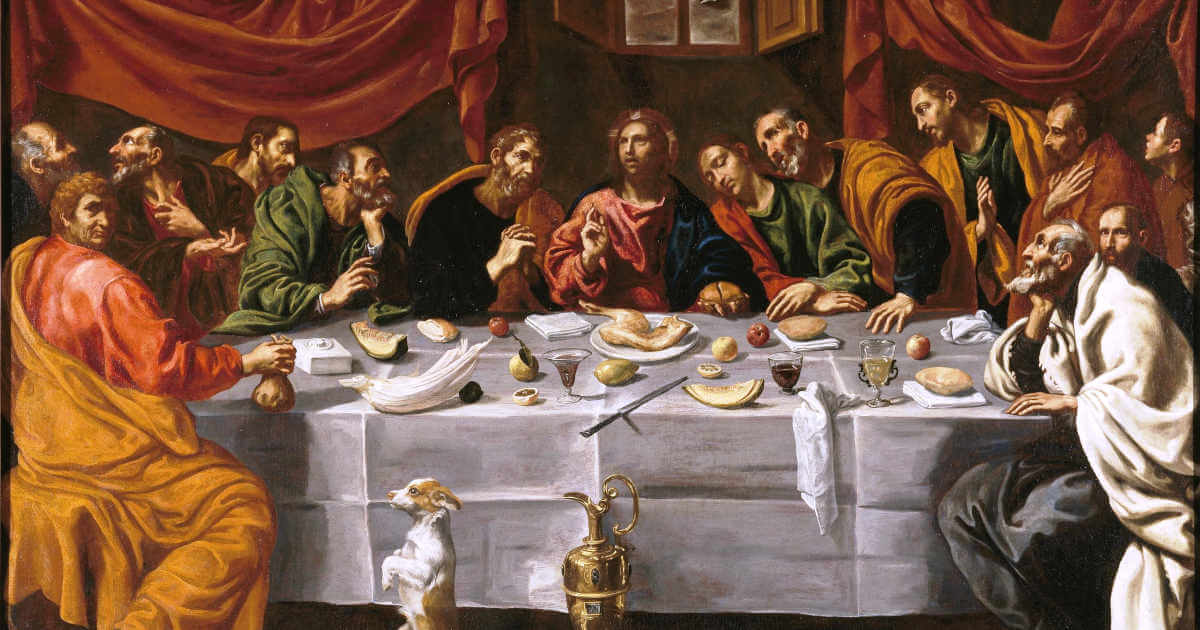
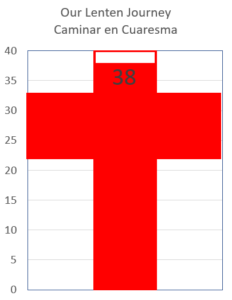
Our Lenten Journey / Caminar en Cuaresma
versión en español
Holy Thursday – April 6 – Day 38
The One True Sacrifice of the Mass
Brothers and sisters: I received from the Lord what I also handed on to you, that the Lord Jesus, on the night he was handed over, took bread, and, after he had given thanks, broke it and said, “This is my body that is for you. Do this in remembrance of me.” 1 Corinthians 11:23–24
We begin the most sacred Triduum, the greatest Feasts in the life of the Church. Tonight we celebrate the Last Supper with our Lord. The Church then keeps vigil in prayer until midnight. Tomorrow, though Holy Communion that was consecrated on Holy Thursday is distributed, the Mass is not celebrated and the tabernacle is empty. We venerate the Cross, recall the Passion, and experience the silence of the death of our Lord. On Holy Saturday, the Liturgy is not celebrated until the sun sets and we begin the Easter Vigil celebration of the Resurrection of our Lord.
Tonight we especially ponder the words of Jesus: “Do this in remembrance of me.” This is not only an invitation; it is a command. A command of love. A command to share in the Memorial Sacrifice of the Savior of the World. The word “memorial” is important to understand. When Jesus said, “Do this in remembrance of me,” He was not simply asking us to remember Him, or to celebrate the Eucharist as a memorial in the normal sense of a memorial. Normally, a memorial is something that is used only to remind us of something that previously took place. There might be a memorial plaque placed at a location of some important event, commemorating the event with a description and date. Or there might be a memorial ceremony where we honor someone who has gone before us. But the Mass is a memorial in a much different way.
As a memorial, or remembrance, our Church teaches that every time the Mass is celebrated, the saving events of the Paschal Mystery are truly made present. The Catechism of the Catholic Church, in quoting the great Council of Trent, states it this way:
The sacrifice of Christ and the sacrifice of the Eucharist are one single sacrifice: “The victim is one and the same: the same now offers through the ministry of priests, who then offered himself on the cross; only the manner of offering is different.” “And since in this divine sacrifice which is celebrated in the Mass, the same Christ who offered himself once in a bloody manner on the altar of the cross is contained and is offered in an unbloody manner. . .” (#1367).
In other words, when we participate in the Mass we are participating in the Sacrifice of Christ; we are present at the Cross. It is His offering that culminated in His victory over sin and death. Thus, when we celebrate this “remembrance,” we do more than remember the Last Supper. We are truly there, truly participating in it, truly experiencing the saving grace of Christ’s gift. It is very easy to “forget” what we actually participate in. Sometimes we can become distracted at Mass. If Mass is celebrated in an irreverent way, if it is rushed or if our minds are somewhere else, then we are standing at the foot of the Cross more like a soldier or bystander than like the Mother of God or people of deep faith.
As we participate in the Last Supper and the saving Sacrifice of Christ this night, reflect upon what you participate in every time you celebrate the Most Holy Eucharist. Pray for the eyes of faith and for the gift of reverence and awe. Pray that the veil be lifted and you be invited to gaze upon the greatest act of love ever known. Allow this night to be a true reminder to you that the Mass is real, is the Holy Sacrifice, is the most important Gift you will ever receive. It is the Gift of the Sacrifice of the Savior of the World.
Let us pray:
My Sacrificial Lord, this night You instituted the Most Holy Sacrifice of the Mass in which Your saving Sacrifice became a permanent Memorial in which we are invited to share. Please open my eyes to the reality of the Mass and help me to always participate in it with deep faith, reverence and love.
Source: mycatholic.life
USCCB Daily Readings: bible.usccb.org/bible/readings/040623.cfm
Jueves Santo – 6 de abril – Día 38
El Único Sacrificio Verdadero de la Misa
Hermanos y hermanas: Recibí del Señor lo que también os he transmitido, que el Señor Jesús, la noche en que fue entregado, tomó pan, y después de haber dado gracias, lo partió y dijo: “Este es mi cuerpo que es para ti. Haz esto en mi memoria.” 1 Corintios 11:23–24
Damos comienzo al Triduo sacratísimo, las Fiestas más grandes de la vida de la Iglesia. Esta noche celebramos la Última Cena con nuestro Señor. La Iglesia entonces vela en oración hasta la medianoche. Mañana, aunque se reparte la Sagrada Comunión que se consagró el Jueves Santo, no se celebra la Misa y el sagrario está vacío. Veneramos la Cruz, recordamos la Pasión y experimentamos el silencio de la muerte de nuestro Señor. El Sábado Santo no se celebra la Liturgia hasta que se pone el sol y damos comienzo a la celebración de la Vigilia Pascual de la Resurrección de Nuestro Señor.
Esta noche meditamos especialmente en las palabras de Jesús: “Haced esto en memoria mía”. Esto no es solo una invitación; es un comando. Un mandato de amor. Un mandato para participar en el Sacrificio Conmemorativo del Salvador del Mundo. Es importante entender la palabra “memorial”. Cuando Jesús dijo: “Haced esto en memoria mía”, no nos estaba pidiendo simplemente que lo recordáramos o que celebráramos la Eucaristía como un memorial en el sentido normal de un memorial. Normalmente, un memorial es algo que se usa solo para recordarnos algo que tuvo lugar anteriormente. Puede haber una placa conmemorativa colocada en el lugar de algún evento importante, conmemorando el evento con una descripción y fecha. O podría haber una ceremonia conmemorativa en la que honremos a alguien que nos ha precedido. Pero la Misa es un memorial de una manera muy diferente.
Como memorial, o recuerdo, nuestra Iglesia enseña que cada vez que se celebra la Misa, se hacen verdaderamente presentes los acontecimientos salvíficos del Misterio Pascual. El Catecismo de la Iglesia Católica, al citar el gran Concilio de Trento, lo dice así:
El sacrificio de Cristo y el sacrificio de la Eucaristía son un solo sacrificio: “La víctima es una y la misma: la misma ahora se ofrece por el ministerio de los sacerdotes, que luego se ofreció a sí mismo en la cruz; sólo la forma de ofrenda es diferente.” “Y puesto que en este divino sacrificio que se celebra en la Misa, está contenido y es ofrecido incruentamente el mismo Cristo que se ofreció una sola vez cruentamente en el altar de la cruz. . .” (#1367).
En otras palabras, cuando participamos de la Misa estamos participando del Sacrificio de Cristo; estamos presentes en la Cruz. Es Su ofrenda la que culminó en Su victoria sobre el pecado y la muerte. Así, cuando celebramos este “recuerdo”, hacemos más que recordar la Última Cena. Estamos verdaderamente allí, participando verdaderamente en él, experimentando verdaderamente la gracia salvadora del don de Cristo. Es muy fácil “olvidar” en lo que realmente participamos. A veces podemos distraernos en la Misa. Si la Misa se celebra de manera irreverente, si es apresurada o si nuestra mente está en otra parte, entonces estamos parados al pie de la Cruz más como un soldado o un transeúnte que como la Madre de Dios o como personas de profunda fe.
Mientras participamos en la Última Cena y el Sacrificio salvador de Cristo esta noche, reflexione sobre en qué participa cada vez que celebra la Santísima Eucaristía. Ore por los ojos de la fe y por el don de la reverencia y el asombro. Oren para que se levante el velo y se les invite a contemplar el mayor acto de amor jamás conocido. Permite que esta noche sea un verdadero recordatorio para ti de que la Misa es real, es el Santo Sacrificio, es el Regalo más importante que jamás recibirás. Es el Don del Sacrificio del Salvador del Mundo.
Oremos:
Mi Sacrificio Señor, esta noche instituiste el Santísimo Sacrificio de la Misa en el cual Tu Sacrificio salvífico se convirtió en un Memorial permanente en el que estamos invitados a compartir. Por favor, abre mis ojos a la realidad de la Misa y ayúdame a participar siempre en ella con profunda fe, reverencia y amor.
Lecturas de Hoy: bible.usccb.org/es/bible/lecturas/040623.cfm
04-05-23 Day 37 Wednesday
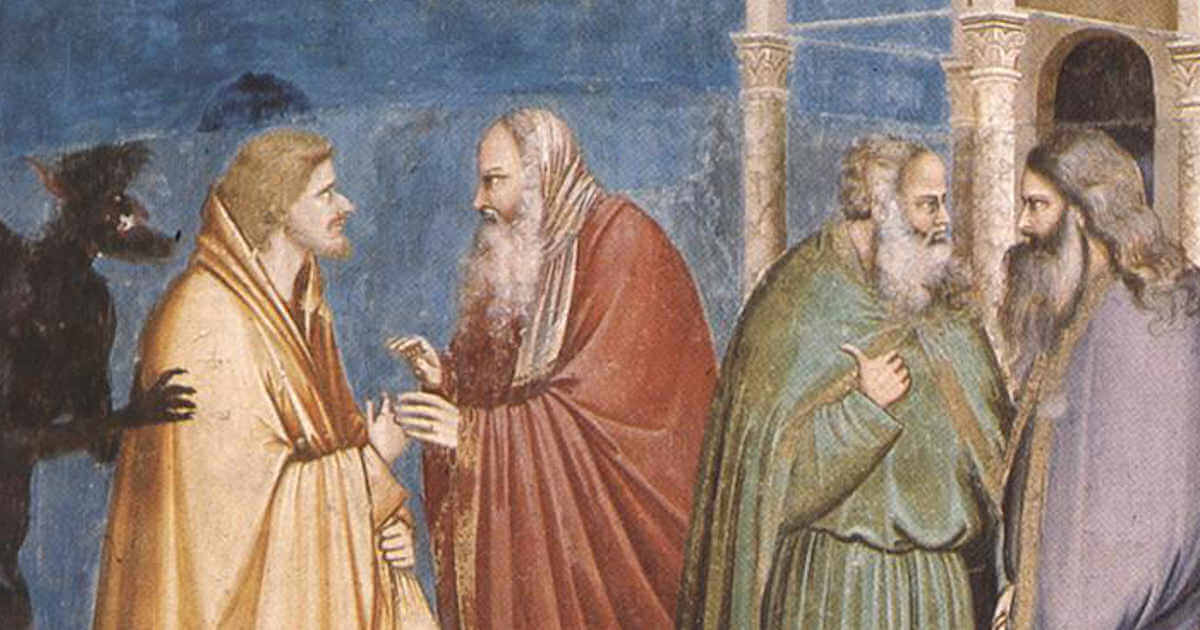
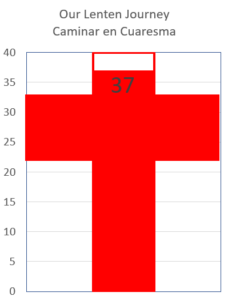
Our Lenten Journey / Caminar en Cuaresma
versión en español
Wednesday – April 5 – Day 37
Rejecting Empty Promises
One of the Twelve, who was called Judas Iscariot, went to the chief priests and said, “What are you willing to give me if I hand him over to you?” They paid him thirty pieces of silver, and from that time on he looked for an opportunity to hand him over. Matthew 26:14–16
The desire for money can become a powerful incentive to betray our Lord. In this Gospel passage, it seems clear that Judas’ betrayal was based on his desire for money. He most likely had some level of faith in our Lord, or he wouldn’t have become His disciple. But even if Judas did have some level of faith, his desire for money appeared to overshadow the faith he may have had.
One of the central lessons we can learn from Judas is that the desire for money is a powerful incentive for the decisions we make. So many of the great saints have taught us that the path to holiness consists, first, in a purification of all our disordered affections. And since one of the most powerful attachments that many struggle with is an attachment to money, this is an important desire to purify in all of our lives.
It’s true that material possessions are not evil when they are used for the fulfillment of God’s will. But the desire for more, for an excess, will always cloud our ability to see clearly the will of God and live for His glory alone.
Once Judas had betrayed our Lord and Jesus was arrested, recall that Judas “deeply regretted what he had done.” And during Jesus’ trial, Judas went back to the chief priests and said “I have sinned in betraying innocent blood” in an apparent attempt to stop the trial. But Jesus’ death was set in motion and could not be stopped. As a result, Judas returned the money and sadly went off to hang himself (See Matthew 27:3–5).
The desire Judas had for money clouded his thinking. And his sin did to him what sin always does. As soon as his sin of betrayal was done, Judas saw the consequences of that choice. And the consequences grieved him deeply. He learned that choosing sin ends with an empty promise. He realized that thirty pieces of silver was not worth the value of his soul. But of course, even then Judas could have repented and received the mercy of God. But he didn’t. He simply ended his life in ultimate despair.
Reflect, today, upon the witness of Judas. Use him as a source of meditation and self-examination this Holy Week. What is it in your life that you desire more than our Lord? What temptation clouds your thinking and leads you to choices that you know will end in emptiness? Strive to eradicate every disordered desire within you this day and choose wisely the will of God instead. Do not let yourself continue to believe the lies that keep you from making Jesus and His holy will the one and only focus of your life.
Let us pray:
My divine Lord, You and You alone must become the focus of my life. You and You alone are of the greatest value in life. Help me to shed all earthly desires in life so that I will not fall into the temptations that lead to empty promises and so that I will embrace the true and fulfilling promises that come from You.
Source: mycatholic.life
USCCB Daily Readings: bible.usccb.org/bible/readings/040523.cfm
Miércoles – 5 de abril – Día 37
Rechazar promesas vacías
Uno de los Doce, que se llamaba Judas Iscariote, fue a los principales sacerdotes y les dijo: “¿Qué me queréis dar si os lo entrego?” Le pagaron treinta piezas de plata, y desde entonces buscó ocasión para entregarlo. Mateo 26:14–16
El deseo de dinero puede convertirse en un poderoso incentivo para traicionar a nuestro Señor. En este pasaje del Evangelio, parece claro que la traición de Judas se basó en su deseo de dinero. Lo más probable es que tuviera cierto nivel de fe en nuestro Señor, o no se habría convertido en Su discípulo. Pero incluso si Judas tenía algún nivel de fe, su deseo de dinero parecía eclipsar la fe que pudo haber tenido.
Una de las lecciones centrales que podemos aprender de Judas es que el deseo de dinero es un poderoso incentivo para las decisiones que tomamos. Muchos de los grandes santos nos han enseñado que el camino a la santidad consiste, primero, en una purificación de todos nuestros afectos desordenados. Y dado que uno de los apegos más poderosos con los que muchos luchan es el apego al dinero, este es un deseo importante de purificar en todas nuestras vidas.
Es cierto que las posesiones materiales no son malas cuando se usan para el cumplimiento de la voluntad de Dios. Pero el deseo de más, de un exceso, siempre nublará nuestra capacidad de ver claramente la voluntad de Dios y vivir sólo para Su gloria.
Una vez que Judas hubo traicionado a nuestro Señor y Jesús fue arrestado, recuerda que Judas “se arrepintió profundamente de lo que había hecho”. Y durante el juicio de Jesús, Judas volvió a los principales sacerdotes y dijo: “He pecado al entregar sangre inocente” en un aparente intento de detener el juicio. Pero la muerte de Jesús se puso en marcha y no pudo ser detenida. Como resultado, Judas devolvió el dinero y tristemente fue a ahorcarse (ver Mateo 27:3–5).
El deseo de dinero que tenía Judas nubló su pensamiento. Y su pecado le hizo lo que el pecado siempre hace. Tan pronto como cometió su pecado de traición, Judas vio las consecuencias de esa elección. Y las consecuencias lo entristecieron profundamente. Aprendió que elegir el pecado termina con una promesa vacía. Se dio cuenta de que treinta piezas de plata no valían el valor de su alma. Pero, por supuesto, incluso entonces Judas podría haberse arrepentido y recibido la misericordia de Dios. Pero no lo hizo. Simplemente terminó con su vida en la máxima desesperación.
Reflexiona, hoy, sobre el testimonio de Judas. Úsalo como fuente de meditación y autoexamen en esta Semana Santa. ¿Qué hay en tu vida que deseas más que a nuestro Señor? ¿Qué tentación nubla tu pensamiento y te lleva a tomar decisiones que sabes que terminarán en el vacío? Esfuércense por erradicar cada deseo desordenado dentro de ustedes este día y elijan sabiamente la voluntad de Dios en su lugar. No te permitas continuar creyendo las mentiras que te impiden hacer de Jesús y Su santa voluntad el único enfoque de tu vida.
Oremos:
Mi divino Señor, Tú y sólo Tú debes convertirte en el centro de mi vida. Tú y sólo Tú tienes el mayor valor en la vida. Ayúdame a despojarme de todos los deseos terrenales de la vida para que no caiga en las tentaciones que llevan a las promesas vacías y para que abrace las promesas verdaderas y cumplidas que vienen de Ti.
Lecturas de Hoy: bible.usccb.org/es/bible/lecturas/040523.cfm
04-04-23 Day 36 Tuesday
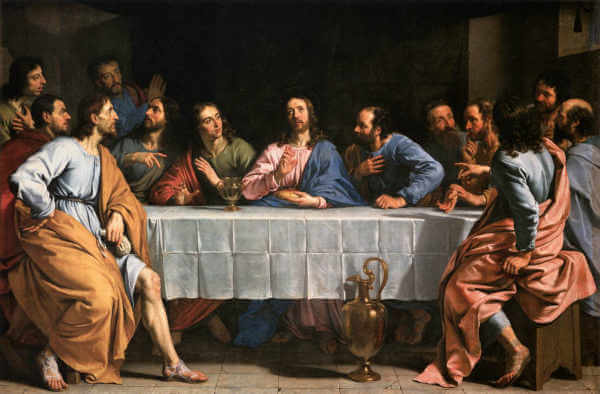
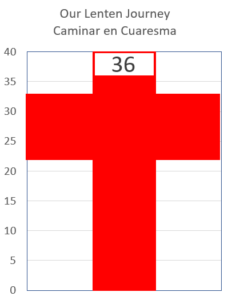
Our Lenten Journey / Caminar en Cuaresma
versión en español
Tuesday – April 4 – Day 36
The Glory of God in All Things
“Now is the Son of Man glorified, and God is glorified in him. If God is glorified in him, God will also glorify him in himself, and he will glorify him at once.” John 13:31–32
Jesus speaks this line about Himself being glorified immediately after Judas leaves the supper to go forth to betray Him. Jesus had just finished washing the feet of His disciples, and soon He would finish the Last Supper, go to the Garden of Gethsemane, be arrested, beaten and crucified. And this was to all take place through the betrayal of one of the Twelve. Yet rather than speak of these pending events in a fearful or anxious way, Jesus points to the glory He will receive through them.
Everything in life has the potential to become an instrument of the glory of God. Even our sin can end in God’s glory when we repent and receive God’s forgiveness. It will not be our sin that glorifies God but His mercy poured forth from the Cross upon us that gives Him glory.
The same is true with the events of Holy Week. When looked at from a purely human perspective, what Jesus endured was tragic and horrific. One of His closest companions betrayed Him. The religious leaders of the time betrayed Him. The civil authorities betrayed Him. And all of the disciples except John fled in fear as Jesus was betrayed. But Jesus did not look at any of this through human eyes alone. He saw it all from the eternal perspective and clearly taught that all of these seemingly tragic events would end in His glory.
When we commit ourselves to the following of Christ, we can be assured that we will also share in His Cross. We will experience the sins of others, encounter mistreatment, and have to endure various sufferings. The question for us all as we have these encounters in life is whether we will endure them in anger and despair or with the hopeful confidence of our Lord. Again, everything in life has the potential to become an instrument of the glory of God. Nothing in life has the power to steal away that glory when we keep our eyes upon the will of God and His power to use all for His glory.
Reflect, today, upon your call in life to see everything from the divine perspective. If you are upset, angry, despairing or confused at times, know that God wants to bring clarity and grace to every situation. He wants to show you how you can share in His divine mission of transforming every evil into God’s glory. Seek out the ways that your life must give glory to God in everything, especially those things that seem incapable of being used for good. The more an experience in life seems incapable of being used for God’s glory, the more that experience is capable of giving true glory to God.
Let us pray:
My glorious Lord, You brought forth good from all things. Even the grave evil of Your betrayal was transformed into a manifestation of Your glory. I offer to You, dear Lord, all that I endure in life and pray that You will be glorified in all things, and that my life will continually become a manifestation of the glory due Your holy name.
Source: mycatholic.life
USCCB Daily Readings: bible.usccb.org/bible/readings/040423.cfm
Martes – 4 de abril – Día 36
La gloria de Dios en todas las cosas
“Ahora es glorificado el Hijo del Hombre, y Dios es glorificado en él. Si Dios es glorificado en él, Dios también lo glorificará en sí mismo, y lo glorificará inmediatamente”. Juan 13:31–32
Jesús dice esta línea sobre sí mismo siendo glorificado inmediatamente después de que Judas deja la cena para salir a traicionarlo. Jesús acababa de terminar de lavar los pies de Sus discípulos, y pronto terminaría la Última Cena, iría al Huerto de Getsemaní, sería arrestado, golpeado y crucificado. Y todo esto iba a tener lugar a través de la traición de uno de los Doce. Sin embargo, en lugar de hablar de estos eventos pendientes de una manera temerosa o ansiosa, Jesús señala la gloria que recibirá a través de ellos.
Todo en la vida tiene el potencial de convertirse en un instrumento de la gloria de Dios. Incluso nuestro pecado puede terminar en la gloria de Dios cuando nos arrepentimos y recibimos el perdón de Dios. No será nuestro pecado el que glorifica a Dios sino Su misericordia derramada desde la Cruz sobre nosotros la que le da gloria.
Lo mismo ocurre con los acontecimientos de la Semana Santa. Cuando se mira desde una perspectiva puramente humana, lo que Jesús soportó fue trágico y horrible. Uno de sus compañeros más cercanos lo traicionó. Los líderes religiosos de la época lo traicionaron. Las autoridades civiles lo traicionaron. Y todos los discípulos, excepto Juan, huyeron atemorizados porque Jesús fue traicionado. Pero Jesús no miró nada de esto solo con ojos humanos. Él lo vio todo desde la perspectiva eterna y claramente enseñó que todos estos eventos aparentemente trágicos terminarían en Su gloria.
Cuando nos comprometemos en el seguimiento de Cristo, podemos estar seguros de que también seremos partícipes de su Cruz. Experimentaremos los pecados de otros, encontraremos maltrato y tendremos que soportar diversos sufrimientos. La pregunta para todos nosotros cuando tenemos estos encuentros en la vida es si los soportaremos con ira y desesperación o con la confianza esperanzada de nuestro Señor. Nuevamente, todo en la vida tiene el potencial de convertirse en un instrumento de la gloria de Dios. Nada en la vida tiene el poder de robar esa gloria cuando mantenemos nuestros ojos en la voluntad de Dios y Su poder para usar todo para Su gloria.
Reflexiona, hoy, sobre tu llamado en la vida para ver todo desde la perspectiva divina. Si a veces está molesto, enojado, desesperado o confundido, sepa que Dios quiere traer claridad y gracia a cada situación. Él quiere mostrarte cómo puedes compartir su misión divina de transformar todo mal en la gloria de Dios. Busca las formas en que tu vida debe dar gloria a Dios en todo, especialmente en aquellas cosas que parecen incapaces de ser usadas para el bien. Cuanto más una experiencia en la vida parece incapaz de ser utilizada para la gloria de Dios, más capaz es esa experiencia de dar verdadera gloria a Dios.
Oremos:
Mi glorioso Señor, sacaste el bien de todas las cosas. Incluso el grave mal de Tu traición se transformó en una manifestación de Tu gloria. Te ofrezco, amado Señor, todo lo que soporto en la vida y oro para que seas glorificado en todas las cosas, y que mi vida se convierta continuamente en una manifestación de la gloria debida a tu santo nombre.
Lecturas de Hoy: bible.usccb.org/es/bible/lecturas/040423.cfm